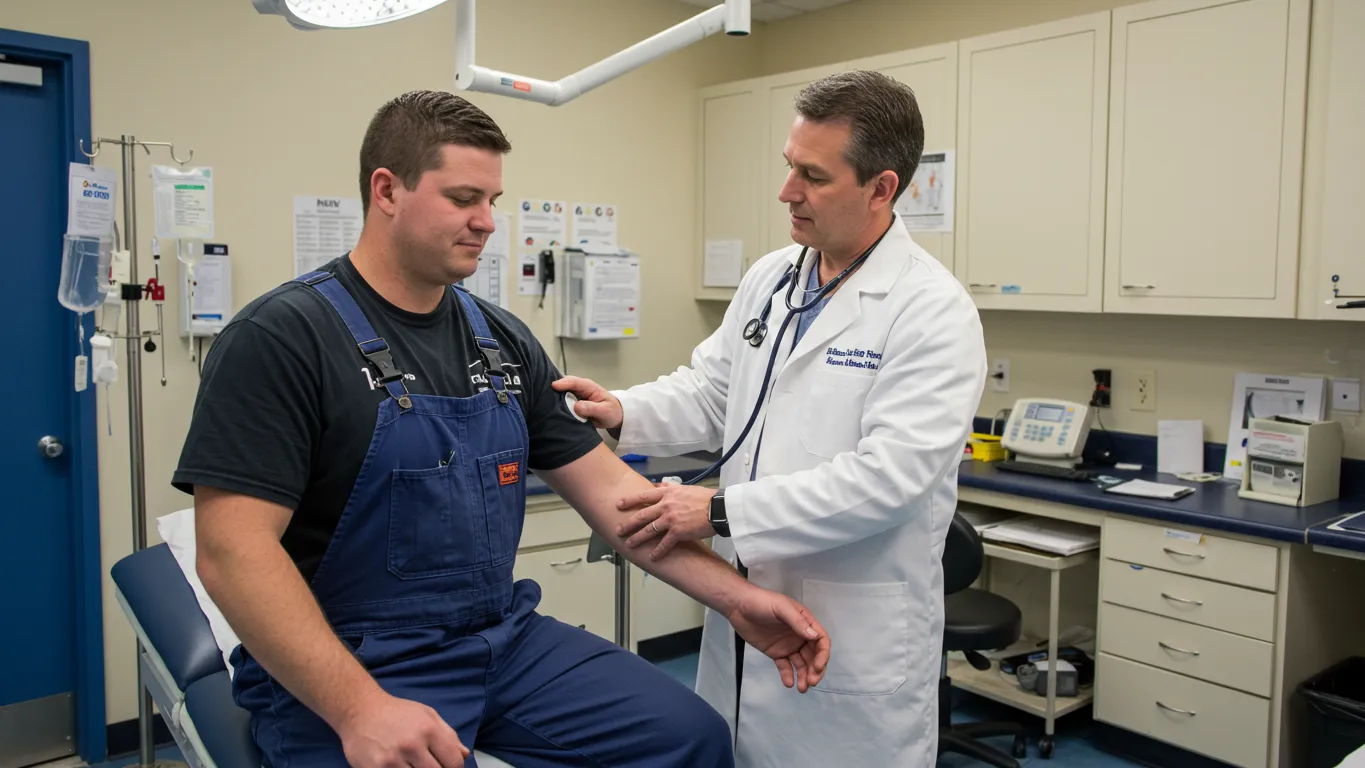
Safety-critical medicals: Bristol and South Wales
Work at height, in confined spaces, at heights, construction work, banksmen, scaffolder and forklift drivers’ medicals
Online booking • Appointments in 2 days • Same-day certificates
Clinics in Bristol and Chepstow, South Wales
Cost: £165 pay-as-you-go; discounts for groups
How to book and prepare for safety-critical medical
Employers (or self-sponsors)
Book online: select date and time, pay and complete the online Referral Form.
Workers
Complete the confidential questionnaire, bring your photo ID, your current prescription, glasses and contact lenses if you use them.
The doctor will examine you and administer a urine dipstick test, a hearing and vision test. If required, you will have spirometry, ECG and a Chester Step Test to check your physical fitness.
What roles require safety-critical medical examinations
Safety-critical work includes tasks where a worker’s ill health can cause a risk to the worker, co-workers, the public, the plant, or the environment.
The employer determines what is safety-critical work after a risk assessment. However, the following roles usually require safety-critical medical examinations:
Certificate of Fitness for Safety-Critical Work
A Safety-Critical Work Certificate is valid for 2 years for healthy workers. Certificate renewal is recommended after a new significant illness or injury.
A Certificate of Temporary Unfitness is issued if a worker requires an up-to-date GP report, medical investigations or treatment (e.g., high blood pressure or unstable diabetes).
A Certificate of Permanent Unfitness is issued for workers with significant permanent impairment (e.g., a permanent vision loss or treatment-resistant epilepsy).
In case of significant health concerns, we may need to contact the worker’s GP (additional fees apply).
If employers require detailed information and advice, we offer a comprehensive occupational health assessment and report, conducted by an occupational health doctor.
Why Choose WorkAble Occupational Health?

We are GMC and FOM-registered occupational health physicians qualified to undertake safety-critical medical examinations and HSE health surveillance.
Over the past 20+ years, we have supported construction, demolition, roadworking, mining, offshore, rail, emergency, and other safety-critical industries.
We provide a doctor-led, convenient service, including online booking, 2-day appointments, and same-day certificates.
A fast, direct, lean service without overheads in compliance with the Health and Safety at Work Act 1974, Equality Act 2010. Accreditations by the GMC, FOM, HSE, and OEUK.
Employee’s legal duties
Under the primary legislation, the Health and Safety at Work Act 1974, employers must provide safe workplaces and systems of work. This includes verifying that workers in high-risk roles are physically fit to work safely.
The Management of Health and Safety at Work Regulations 1999 require a suitable and sufficient risk assessment to ensure health and safety.
Under the Common Law, Employers must take reasonable care of their workers and reduce the risk of reasonably foreseeable injuries.
Certain industries have specific guidelines for safety-critical workers. For instance, organisations such as Oil and Energy UK, Energy Institute UK, DVLA, Network Rail, Police, or Fire Service arrange their own medical checks.
In addition, safety-critical workers may require health surveillance, e.g., under noise, ionising radiation, vibration, asbestos or COSHH regulations.
Safety-critical Medicals: Frequently Asked Questions
What is a safety-critical medical in Bristol?
Which construction jobs in Bristol require safety-critical medicals?
These construction jobs include scaffolders, banksmen, crane operators, electricians, confined space workers, riggers, demolition workers, high-risk tool and plant operators (e.g., excavator or bulldozer operators). These roles involve tasks like working at heights or operating heavy machinery, where health issues could pose significant risks.
What tests are included in a construction medical?
A construction safety-critical medical includes a detailed health questionnaire, physical examination, vision and hearing tests, urinalysis, and additional tests like ECG or spirometry if required. The assessment takes about 40-50 minutes.
How to get a safety-critical medical in Bristol or Chepstow?
You can book a safety-critical medical online.
How often are safety-critical medicals needed?
Safety-critical medicals are typically required every 2 years for healthy workers. Workers with health conditions, such as high blood pressure, may need more frequent checks. It is a good practice to renew the safety-critical medical for workers who develop a significant medical condition.
What happens if I don’t pass my safety-critical medical?
If a significant health issue is found during your safety-critical medical, you may receive a temporary unfitness certificate, requiring further medical evaluation or treatment. In severe conditions, permanent loss of vision or hearing, we may issue a permanent unfitness certificate.
In more complex cases, we offer occupational health assessments to advise on redeployment to adjusted (non-safety-critical) work, temporarily or permanently.

